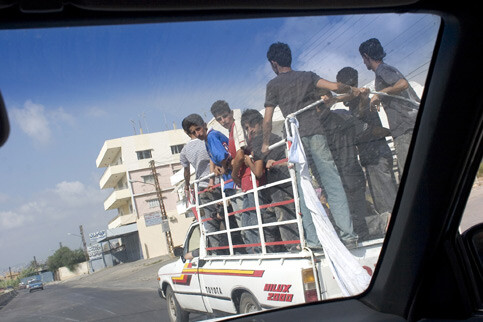IRIN 1 August 2006

Lebanese refugees fleeing to the northern villages in Lebanon after Israeli raids on southern villages, 31 July 2006. (MaanImages/Raoul Kramer)
BEIRUT - Despite intense Israeli air strikes in the south of Lebanon and repeated Israeli warnings to leave the area, there are still thousands of Lebanese in the territory adjoining the Israeli-Lebanese border.
“It is not easy to abandon your home not knowing when you will return,” said Maysoon Arbid, who managed to flee Ainata village, near Bint Jbeil, in south Lebanon last week.
According to the Lebanese government, as many as 600,000 people have fled the south in the past 20 days, creating a displacement crisis in the north and in the capital, Beirut.
Some families have decided that it is too dangerous to leave their homes; others are too poor to go, and many are simply unwilling to face the indignity of becoming displaced persons and having to rely on charity.
“I left because I wanted to get my young nephews out of there,” said Arbid. “But my mother and father stayed behind. Sixteen civilians in Marwahin village were killed on the road to the north by an Israeli air strike [on 15 July] after they were warned to leave the village by the Israeli military. So we were all scared to leave our houses. The view of the elder generation is that they would rather die with dignity in their homes than be killed on the road.”
Arbid is typical of many residents in south Lebanon: torn between wanting to flee and wanting to stay in their homes, and faced by a shortage of available cars, a shortage of fuel for the cars, and bombed out roads. She said people in the villages were often too busy helping needy neighbours and taking in those who had lost their homes to even think of leaving.
“Most of them don’t have the money or they don’t have a place to leave to,” said Timur Goksel, a professor at the American University of Beirut and a spokesman for the United Nations Interim Force in Lebanon for 20 years. “They don’t want to come to Beirut and live on hand-outs, so they decide to stay put and trust Allah.”
Given the history of Palestinian refugees and the thousands of Lebanese displaced during the 1975-1990 civil war, many do not want to leave their homes for fear they will never be able to return. “Lots of people coming from the south say they will become like Palestinians and never go home again,” said Fatima Hachem, a volunteer at a refugee centre in west Beirut.
The Lebanese government said up to 750 Lebanese civilians had been killed in the conflict so far, with most of the deaths occurring in the south. During the same period, a total of 51 Israelis, including at least 18 civilians, were killed by Hizbullah rockets fired into northern Israel, according to the Israeli Defence Force (IDF).
The Israelis said they have repeatedly warned southerners to leave their homes, using loudspeakers, phone calls and leaflets dropped from aircraft, and were targeting only Hizbullah fighters and the “terrorist infrastructure”.
After the IDF’s attack on Qana village on Sunday, Israeli Prime Minister Ehud Olmert said Israel “deeply regrets the killing of civilians”. More than 55 people, including some 37 children, were killed in the air strike.
“The goal was to strike at Hizbullah, and not civilians, whom Hizbullah uses as human shields,” said Olmert.
The IDF said it has enshrined the principles of humanitarian law into its Manual on the Laws of War, while Israel’s Ministry of Foreign Affairs said international law recognised that civilian deaths and injuries might occur in lawful military operations.
Meanwhile, the Lebanese who have left their homes in the south describe a difficult and dangerous trip. “A journey which should only take one or two hours took 10 hours,” said Majida Hawila, a mother of eight from the southern village of Bazouriya, who is now in a refugee centre in east Beirut.
“My son had to drive very fast and we came off the road and drove into a ditch because we could hear the sound of bombs around us - there are bomb craters in the roads that we had to dodge.”
Related Links
This item comes to you via IRIN, a UN humanitarian news and information service, but may not necessarily reflect the views of the United Nations or its agencies. All IRIN material may be reposted or reprinted free-of-charge; refer to the copyright page for conditions of use. IRIN is a project of the UN Office for the Coordination of Humanitarian Affairs.